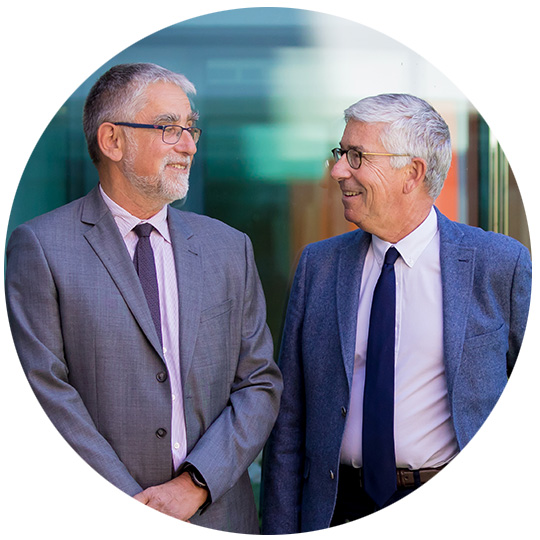Joint interview Patrick Dehaumont Chair of the Board of Administrators — Benoit Vallet Director General

Benoit Vallet, Director General, and Patrick Dehaumont, Chair of the Board of Administrators, analyse the challenges ANSES is facing in light of its activities over the last 18 months, along with its outlook.
European harmonisation
BENOIT VALLET.
The European Union (EU) is entering a new political cycle to which we will be paying close attention. For several of its missions, ANSES is dependent on the EU’s progress in terms of risk assessment and harmonisation of the rules applicable in all Member States. In particular, in the area of plant protection products, ANSES is extremely vigilant when it comes to harmonising assessments within the EU, to ensure optimum safety and efficacy. Assessment methodologies need to be adapted
to meet these objectives; it is also important that they evolve to take account of the most recent data on the exposure of certain population groups or the use of new treatment application techniques, for example. The Agency is also keeping a close eye on developments relating to endocrine disruptors (EDs): as France is taking stock of its second national strategy, let’s not forget that the recent introduction of “ED” hazard classes in the European CLP (Classification, Labelling, Packaging) Regulation enabling endocrine-disrupting properties to be taken into account consistently for all uses of a substance, was based on work carried
out by ANSES. Since 2022, our role in coordinating the European Partnership for the Assessment of Risks from Chemicals (PARC) has helped to strengthen our position as a key player and driving force within the EU.
Synergies between agencies
BENOIT VALLET.
Inter-agency cooperation allows us to take advantage of synergies and more effectively call on the scientific community in response to common challenges. We interact daily with the European Food Safety Authority (EFSA) and the European Chemicals Agency (ECHA), and are working to develop exchanges with the European Environment Agency (EEA). In EFSA’s Management Board and Advisory Forum, we support proposed partnership arrangements between EFSA and its national counterparts. It is at this Community level that our work on new genomic techniques, the toxicity of PFASs and animal welfare labelling takes on its full meaning. At national level, a One Health partnership agreement will soon be signed with Santé publique France, with which we are cooperating as part of the SAGA scheme for the active surveillance of avian influenza; this public health agency is also working with us as we prepare to launch the ambitious Albane study (see page 70). The 30th anniversary of the French Agency for Veterinary Medicinal Products (ANMV), which is part of ANSES (see page 28), echoes the long-standing ties forged with the National Agency for Medicines and Health Products Safety (ANSM). In a few months’ time, teams from ANSES and the ANSM will be sharing the same building in Lyon, thereby promoting links between human and animal health and environmental quality.
Access to data
PATRICK DEHAUMONT.
Whether for purposes of scientific expert appraisal, vigilance or crisis support, the Agency needs robust, interoperable databases and scientific research covering the full scope of its missions. The Board of Administrators is aware of the significant progress that needs to be made in these two areas. In this regard, I commend the Agency, on the one hand, for its involvement in the collection of new data – for example, with the new Indoor Environment Quality Observatory, launched in early 2024 – and, on the other, for its commitment to forging closer links with agencies from programmes that will be proposing priorities for French scientific research this summer. The Board of Administrators endorses the development of a genuine data strategy at ANSES. In this context, ANSES’s efforts to include the exposome in the strategy to accelerate prevention, and to help structure the cross-referencing of health and environmental data, should be supported. These data challenges should also be considered at European and international level, in the context of global health going beyond national borders.
Health and climate
PATRICK DEHAUMONT.
Scientific excellence, transparency, independence, openness and dialogue: these are the principles that have underpinned the efforts of ANSES’s employees and groups of experts since 2010. On behalf of the Board of Administrators, I applaud the quality of their work and their loyalty to this line of action, which are both marks of confidence in the Agency. While the 2023-2027 goals and performance contract emphases the importance of a comprehensive approach to risks, deployed by ANSES under the banner of One Health, the administrators are following with interest the integration of climate change into the range of issues, methods and priorities considered by the Agency, as well as the progress noted at internal seminars, including the recent managers’ seminar held in May 2024. I will personally be paying close attention to how these orientations are reflected in the Agency’s work programme for 2025, and to the involvement of the international Scientific Board in these discussions.
ANSES plays a part both in the short term to respond to crises and in the long term to address systemic and global changes affecting health and the environment. Our staff and experts work tirelessly to meet this dual challenge, and I would like to pay tribute to their commitment